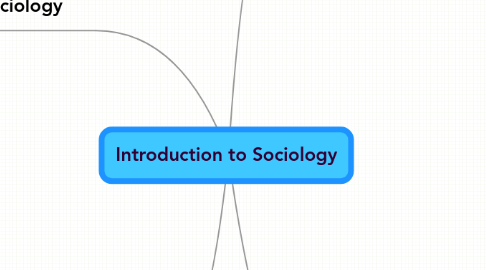
1. 5 Basic Traditions of Concern in Sociology
1.1. Culture
1.1.1. What society gives to individuals
1.1.1.1. how it binds them together
1.1.2. how society shapes us
1.2. Interaction
1.2.1. how individuals are shaped by dealing with the demands of others
1.2.2. how individuals are shaped by dealing with the demands of society
1.2.3. effects on attitudes
1.2.4. interaction with those around us
1.2.5. none of us live in isolation
1.3. Demography
1.3.1. population increasing or decreasing
1.3.2. kinds of people leaving areas and coming into areas
1.3.3. where people are coming from or leaving for
1.3.4. who is going to show up, and from where
1.4. Stratification
1.4.1. who gets what, how much, and why
1.4.2. social class
1.4.3. economics
1.4.4. carl marx
1.5. Organization
1.5.1. obtaining power
1.5.1.1. by obtaining resources
1.5.1.2. by gaining control
1.5.2. powerless to bind themselves together
1.5.3. businesses
1.5.4. religion
2. What is Sociological Theory?
2.1. identifying the social forces that affect...
2.2. attempts to expalin events, forces, materials, ideas, or behavior in a comprehensive manner
2.3. a set of statements that seeks to explain problemss, actions, or behavior
3. What is Sociology?
3.1. very broad subject
3.2. social organizations, social forms
3.3. human behavior
3.3.1. patterns
3.3.2. historical context
3.3.3. social contexts
3.4. human lifestyles
3.5. center of reflection of social sciences, the study of the whole
3.5.1. Economy
3.5.2. political process
3.5.3. political institutions
3.5.4. culture
3.6. logical and scientific link by which all our natural observations are whole
3.7. how groups of people interact
3.7.1. any size groups
3.7.2. religion
3.7.3. ethnic groups
3.7.4. club
3.7.5. profession, etc..
3.8. dynamics of society
3.9. human behavior within a social framework
3.10. sociological imagination
3.10.1. key element is the ability to view one's own society as an outsider would, rather than only from the perspective of personal experiences and cultural biases.
3.10.2. allows us to go beyond personal experiences and observations to understand broader issues
3.10.3. look beyond a limited understanding of human behavior to see the world and its people in a new way and through a broader lens than we might otherwise use.
3.10.4. an awareness of the relationship between an individual and the wider society, both today and in the past.
3.11. the scientific study of social behavior and human groups
4. The Development of Sociology
4.1. Auguste Comte
4.1.1. 1798-1857
4.1.2. French
4.1.3. Feared that the excesses of the French Revolution had permanently impaired France's stability.
4.1.4. Hoped that the systematic study of social behavior would eventually lead to more rational human interactions
4.1.5. coined the term sociology
4.2. Harriet Martineau
4.2.1. 1802-1876
4.2.2. English
4.2.3. Observations of customs and social practices of both Britain and the US
4.2.4. Book: Society in America
4.2.4.1. religion
4.2.4.2. politics
4.2.4.3. child rearing
4.2.4.4. immigration
4.2.4.5. social class distinctions
4.2.4.6. gender
4.2.4.7. race
4.2.5. emphasized the impact that the economy, law, trade, health, and population could have on social problems
4.2.5.1. Activist
4.2.5.1.1. women's rights
4.2.5.1.2. religious tolerance
4.2.5.1.3. emancipation of slaves
